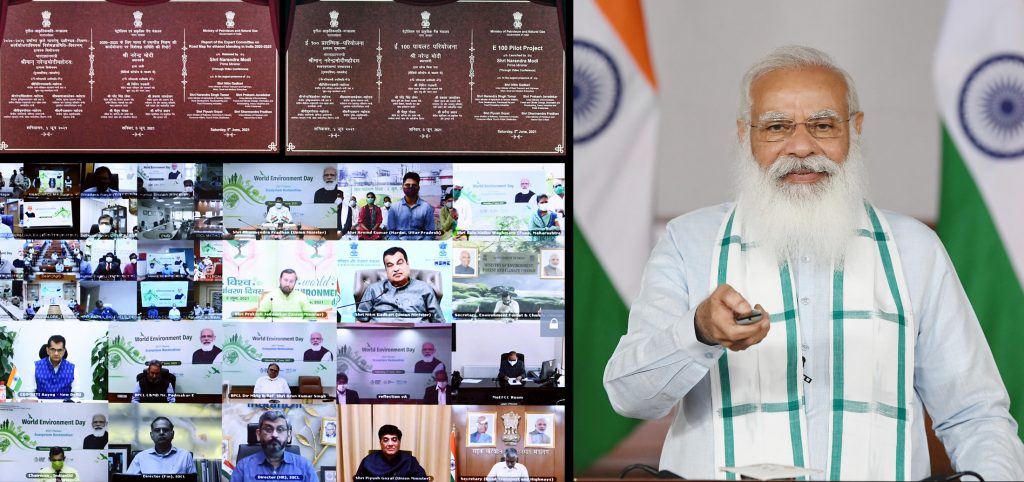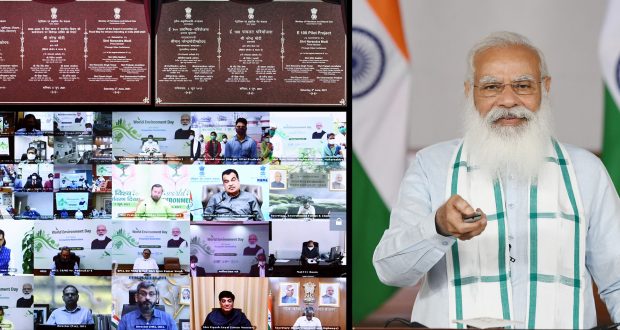TBB BUREAU
NEW DELHI, JUNE 5, 2021
India has advanced the target date for achieving 20 per cent ethanol-blending in petrol by five years to 2025, Prime Minister Narendra Modi said on Saturday
Speaking at the release of ethanol blending road map 2020-25 on the occasion of World Environment Day today, Modi said “the target for mixing 20 per cent ethanol in petrol has been brought forward from 2030 to 2025”.

Last year, the government had set a target of reaching 10 per cent ethanol blending in petrol (10 per cent of ethanol mixed with 90 per cent of petrol) by 2022 and 20 per cent doping by 2030.
Currently, about 8.5 per cent ethanol is mixed with petrol as against 1.5 per cent in 2014, he said adding that higher blending has led to ethanol procurement jumping from 38 crore litres to 320 crore litres.
The Prime Minister said the focus on ethanol is having a better impact on the environment as well as on the lives of farmers as it gives them another source of income.
He said that a large part of this eightfold increase in ethanol procurement has benefitted the sugarcane farmers of the country.
The Prime Minister said that the 21st century India can get energy only from the modern thinking and modern policies of the 21st century. With this thinking, the government is continuously taking policy decisions in every field. He said today, a lot of emphasis is being laid on building the necessary infrastructure for the production and purchase of ethanol in the country. Most of the ethanol manufacturing units are mostly concentrated in 4-5 states where sugar production is high but now Food Grain Based Distilleries are being established to expand this to the whole country. Modern technology based plants are also being set up in the country to make ethanol from agricultural waste.
He further said that India is a strong proponent of climate justice and is moving ahead with a lofty global vision like the founding of International Solar Alliance for realizing the vision of One Sun, One World, One Grid and the Coalition for Disaster Resilient Infrastructure initiative. He noted India has been included in the top 10 countries of the world in the Climate Change Performance Index. He added that India is also aware of the challenges that are being faced due to climate change and is also working actively.
He also spoke about the hard and soft approaches taken to fight climate change. On the hard approach, he noted that our capacity for renewable energy has increased by more than 250 percent in the last 6-7 years. India is today among the top 5 countries of the world in terms of installed renewable energy capacity. Especially the capacity of solar energy has increased by about 15 times in the last 6 years.
The Prime Minister said that the country has also taken historic steps with a soft approach, today the common man of the country has joined and leading the Pro-Environment Campaign like avoiding single use plastic, beach cleaning or Swachh Bharat. He added that the impact of giving more than 37 crore LED bulbs and more than 23 lakh Energy Efficient Fans are not discussed often. He said similarly, by providing free gas connections under the Ujjwala scheme, by providing electricity connections under the Saubhagya scheme, to crores of poor, their dependence on wood has greatly reduced. Apart from reducing pollution, it has also helped a lot in improving the health and strengthening environmental protection. He said India is setting an example to the world that it is not necessary to stop development for protecting the environment. He stressed that Economy and Ecology both can go together and move forward. And this is the path India has chosen. He said along with strengthening the economy, our forests have also increased by 15 thousand square kilometers in the last few years. The number of Tigers in our country has doubled and the number of leopards has also increased by about 60 percent in the last few years.
The Prime Minister said Clean and Efficient Energy Systems, Resilient Urban Infrastructure and Planned Eco-Restoration are a very important part of the AatmaNirbhar Bharat Campaign. He said due to all the efforts taken related to the environment, new investment opportunities are being created in the country, lakhs of youth are also getting employment. He said India is working with a holistic approach through the National Clean Air Plan to curb air pollution. He said the work on waterways and multimodal connectivity will not only strengthen the mission of green transport, but also improve the logistics efficiency of the country. Today, the service of metro rail in the country has increased from 5 cities to 18 cities which has helped in reducing the use of personal vehicles.
Modi said that today, a large part of the country’s railway network has been electrified. Airports of the country are also made to use electricity from solar energy at a rapid pace. He elaborated that before 2014, only 7 airports had a solar power facility, whereas today this number has increased to more than 50. More than 80 airports have been installed with LED lights which would improve energy efficiency.
He spoke about a project which is underway to develop Kevadiya as an electric vehicle city. He said necessary infrastructure is being made available so that only battery based buses, two-wheeler, four-wheeler will run in Kevadiya in future. He said the water cycle is also directly related to climate change and imbalance in the water cycle will directly affect water security. He told that work is being done with a holistic approach from creation and conservation to use of water resources in the country through Jal Jeevan Mission. On one hand, every household is being connected with pipes, while on the other hand, the focus is on raising the ground water level through campaigns like Atal Bhujal Yojana and Catch the Rain.
 The Business Bytes
The Business Bytes
